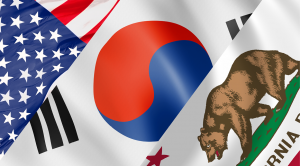
The California Chamber of Commerce reaffirmed support for the
U.S.-Korea Free Trade Agreement (KORUS) in a letter sent September 5 to members of the Trump administration, including the Secretary of Commerce and the U.S. Trade Representative.
The U.S. business and agriculture community had received reports over the Labor Day weekend that the administration was considering withdrawing from the agreement, due to the imbalance of trade figures.
By September 7, however, news sources were reporting that the White House had assured key lawmakers, including House Speaker Paul Ryan (R-WI), that the administration had decided not to withdraw from the agreement.
Fallout
Withdrawing would harm many in the U.S. business and agriculture communities and help few. It would also alienate a key ally at a time when regional security is fragile.
Defending KORUS is a priority issue for the U.S. Chamber, the CalChamber, and businesses across the country, as the agreement has high standard rules and significant tariff savings that have allowed the United States to compete effectively against Korea’s 11 other free trade agreement (FTA) partners.
Per the U.S. Chamber, the United States does have a $28 billion goods deficit with Korea. From 2014 to 2016, however, Korea’s imports from the world fell 22%, causing significant losses to Korea’s other trade partners while U.S. exports during that time held steady, thanks to KORUS.
The bulk of the U.S. deficit is autos and electronics. U.S. imports of Korean cars have roughly doubled, but this transpired without any reduction in U.S. tariffs. In other words, KORUS has had nothing to do with the $24 billion worth of Korean vehicles that America imported last year; rather, it is attributable to strong auto demand in the U.S. as Korea sold into a U.S. market. At the same time, imports from Korea are trending down, while U.S. vehicle exports to Korea continue to rise from a low base.
The U.S. business community views KORUS as a strong agreement as written, and urges the administration to focus on more effective enforcement to solve issues as Korea’s economy improves.
Following the U.S. withdrawal from the Trans-Pacific Partnership, if the U.S. now withdraws from KORUS, the U.S. will lose significant market share to the European Union, Australia, China and others while sending a very dangerous message that America is not interested in doing business in Asia and at the same time also significantly damaging America’s influence.
Statistics
Small and medium-sized companies make up a majority of U.S. businesses exporting to Korea.
Korea is California’s seventh largest export destination. California is the top exporting state to Korea, making up nearly 20% of U.S. exports. In 2016, California exported more than $8.2 billion to Korea. Top products from California to Korea included nonelectrical machinery, computers and electronics, transportation equipment and food products.
According to the most recent figures, U.S. foreign direct investment in Korea totaled roughly $34.6 billion and was concentrated largely in the manufacturing, banking, and wholesale trade sectors. Korean foreign direct investment to the United States reached $40 billion.
U.S.-Korea FTA
The CalChamber was part of a broad-based coalition that waged a multi-year campaign to secure congressional passage of the U.S.-Korea FTA, which was implemented on March 15, 2012.
Implementation of the U.S.-Korea FTA has eliminated tariffs and other barriers to trade in goods and services, promoted economic growth, and enhanced trade between the United States and Korea.
The FTA strengthens a more than 60-year-old alliance between the United States and South Korea, while reinforcing the economic and political reforms South Korea continues to make.
For more information, see www.calchamber.com/international.

